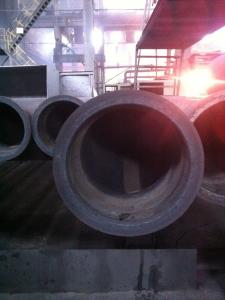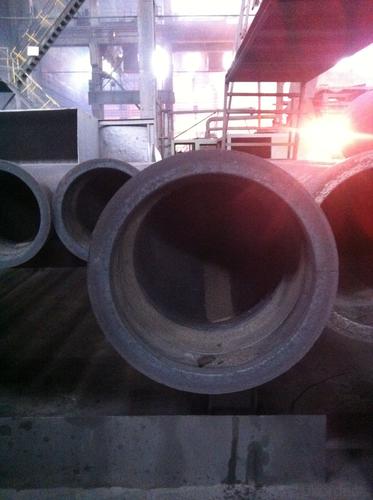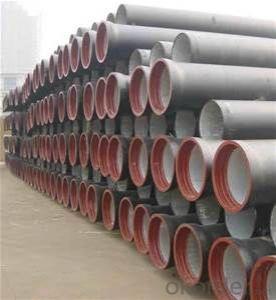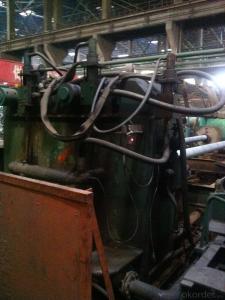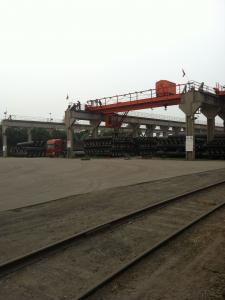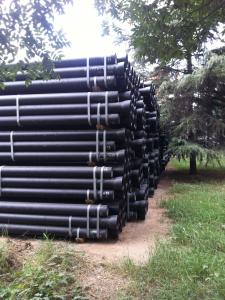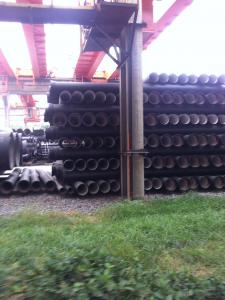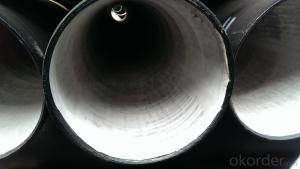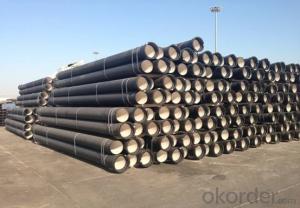DUCTILE IRON PIPES AND PIPE FITTINGS K9 CLASS DN1000
- Loading Port:
- Tianjin
- Payment Terms:
- TT OR LC
- Min Order Qty:
- 22 pc
- Supply Capability:
- 3000 pc/month
OKorder Service Pledge
OKorder Financial Service
You Might Also Like
Material : Ductile Cast Iron
Size Range : DN 80mm to DN 2000mm
Unit Effective Length : 6m or 5.7m
Manufacture Standard: ISO 2531:1998/ EN 545:2006/EN 598:2007
Annual capacity : 200,000 tons
Coating Exterior: Zinc 130g/m2 according to ISO 8179-1 and bitumen coating 70 microns.
Cement Interior: Portland Cement/ High Alumina Cement/ Sulphate Resisting Cement Lining according to ISO 4179
Special requirements on external coating and internal lining can be applied
We also provide accessories such as SBR/EPDM rubber gaskets, lubricant paste, pipe caps, PE sleeves, etc.
Additional Parts:
Each pipe is strictly inspected according to related standard to ensure permanently high performance.
Easy Installation at site and service free for life
Long Service Lifespan
Quotation will arrive you within 24hours once we get your inquiry.
We guarantee offering you a competitive price.
A copy of original inspection reports of pipes will be offered after shipment.
Photos of loading process will be sent to the customer after shipment effect.
We will follow-up the delivery progress after shipment effect and update to the customer on weekly basis.
- Q: How is ductile iron pipe different from cast iron pipe?
- Ductile iron pipe and cast iron pipe are both commonly used for various plumbing and drainage applications. However, they differ in terms of their composition, strength, and flexibility. Firstly, ductile iron pipe is made from a different type of iron alloy compared to cast iron pipe. Ductile iron contains a higher percentage of carbon and silicon, which gives it enhanced strength and durability. On the other hand, cast iron pipe is made from gray iron, which has a higher carbon content but lacks the flexibility of ductile iron. Secondly, ductile iron pipe is known for its superior strength and impact resistance. It can withstand higher pressures and is less prone to cracking or breaking under heavy loads or external forces. Cast iron pipe, while strong, is more brittle and can be prone to fractures and failures. Another significant difference is the flexibility of ductile iron pipe. It has a greater degree of flexibility and can withstand bending and deformation without breaking. This flexibility allows for easier installation, especially in areas with uneven terrain or where ground movement may occur. In contrast, cast iron pipe is less flexible and more rigid, making it less suitable for certain applications where flexibility is essential. Additionally, ductile iron pipe has a smoother interior surface compared to cast iron pipe. This smoothness reduces friction, improves flow efficiency, and minimizes the accumulation of sediment and deposits within the pipe, resulting in better water flow and reduced maintenance requirements. In summary, ductile iron pipe differs from cast iron pipe in terms of its composition, strength, flexibility, and interior surface smoothness. Ductile iron offers superior strength, impact resistance, and flexibility, making it a preferred choice in various plumbing and drainage applications.
- Q: Can ductile iron pipe be used for water treatment plant applications?
- Ductile iron pipe is indeed applicable for water treatment plant purposes. Renowned for its robustness and endurance, this type of pipe is well-suited for the conveyance of water and other liquids in diverse industrial environments, such as water treatment facilities. Its exceptional resistance to corrosion and capacity to endure substantial pressure and temperature make it an ideal selection for scenarios where the pipe is exposed to chemicals, disinfectants, and other treatment procedures. Moreover, the installation, maintenance, and repair of ductile iron pipe are straightforward, rendering it a cost-efficient alternative for water treatment plant infrastructure.
- Q: What is the average weight of ductile iron pipes?
- The weight of ductile iron pipes can differ based on their specific dimensions and specifications. However, as a general rule, the weight of ductile iron pipes usually falls within the range of 50 to 200 pounds per foot. Various factors, including the pipe's diameter, wall thickness, and length, affect its weight. It is essential to understand that these weights are averages, and the actual weight of a particular ductile iron pipe may differ. To accurately determine the weight of a ductile iron pipe, it is recommended to consult the manufacturer's specifications or engineering guidelines.
- Q: Are ductile iron pipes resistant to root intrusion?
- Yes, ductile iron pipes are generally resistant to root intrusion due to their strong and durable composition.
- Q: How are ductile iron pipes tested for quality?
- Various methods are employed to test the quality of ductile iron pipes, ensuring they meet required standards and specifications. One commonly used test is the hydrostatic pressure test, wherein the pipes are subjected to high-pressure water or other liquids to detect leaks or weaknesses. Water is typically used to fill the pipes, with the pressure gradually increased to a predetermined level. This test effectively identifies potential defects that could compromise the pipes' integrity. Another important quality test for ductile iron pipes is the tensile test. This involves pulling a sample of the pipe until it breaks, measuring the applied force and elongation. By doing so, the pipe's tensile strength and ductility can be determined, ensuring it can withstand required loads and stresses without deformation or failure. In addition to these tests, other quality checks include visual inspection, dimensional checks, and surface defect examinations. Visual inspection involves scrutinizing the pipes for visible defects like cracks, voids, or surface irregularities. Dimensional checks ensure the pipes meet specified dimensions and tolerances. Furthermore, ductile iron pipes often undergo corrosion resistance tests. This entails exposing the pipes to corrosive environments such as saltwater or acidic solutions to evaluate their resistance to corrosion. This is vital in determining the pipes' durability and longevity, particularly in harsh conditions. Overall, ductile iron pipes undergo rigorous testing to ensure their quality and performance. These tests guarantee that the pipes meet required standards, are safe for use, and can withstand anticipated loads and environmental conditions in their intended applications.
- Q: How does the white iron appear in the case of ductile iron?
- Casting cooling, surface and thin section at often produce white. White tissue hard and brittle, poor processing performance, easy peeling. So it is necessary to use the annealing (or normalizing) method to eliminate white tissue. The annealing process: heating to 2 DEG C 550950 ~ 5 h, then 500 to 550 DEG C Furnace cooling again followed by air cooling. During high temperature insulation, high travel cementite eutectic cementite decomposition of graphite and A in the subsequent two carburizing cooling process and eutectoid cementite decomposition, graphitization process. Due to the decomposition of cementite, resulting in the decrease in hardness, thereby improving machinability.Hope to help you.
- Q: What are the different methods for cutting ductile iron pipe?
- The cutting of ductile iron pipe can be done in various ways, depending on the project's specific needs and limitations. Some commonly used methods include: 1. Manual Cutting: To cut through the ductile iron pipe, one can employ a handheld saw or grinder equipped with an abrasive cutting wheel. While this method is simple and cost-effective, it can be laborious and time-consuming for larger pipe sizes. 2. Mechanical Cutting: Specialized machinery, such as bandsaws, pipe cutters, or hydraulic cutting machines, can be utilized to mechanically cut through the ductile iron pipe. These machines offer faster and more precise cuts, especially for larger pipe sizes. However, they tend to be more expensive and require skilled operators. 3. Torch Cutting: Also known as oxyfuel cutting, torch cutting involves heating the ductile iron pipe using a torch and then introducing a high-pressure oxygen stream to facilitate a chemical reaction that cuts through the metal. This method is effective for thick-walled ductile iron pipes but necessitates proper safety precautions due to the significant heat and sparks it generates. 4. Plasma Arc Cutting: The utilization of a high-velocity jet of ionized gas (plasma) to melt and cut through the ductile iron pipe characterizes plasma arc cutting. This method is ideal for precision and efficiency when cutting through thick-walled pipes. However, it can be more costly and may require specialized equipment and training. 5. Waterjet Cutting: Waterjet cutting involves using a high-pressure jet of water mixed with an abrasive material to cut through the ductile iron pipe. This method offers high precision and does not generate heat or sparks, making it suitable for sensitive environments. However, it tends to be slower and more expensive compared to other cutting methods. When selecting the appropriate method for cutting ductile iron pipe, factors such as pipe size, project requirements, budget, and safety must be taken into consideration. Consulting professionals or experts in the field can assist in determining the most suitable method for a specific project.
- Q: How do ductile iron pipes handle ground settlement near construction sites?
- Ductile iron pipes are highly resilient and can withstand ground settlement near construction sites. Due to their flexible nature, these pipes can accommodate small movements and settlement without incurring significant damage or failure. The ductility of the material allows the pipes to bend and adjust to the changing ground conditions, ensuring their integrity and minimizing the risk of leaks or breakage. Additionally, the strong and durable properties of ductile iron make it a reliable choice for underground infrastructure, providing long-term stability even in challenging environments.
- Q: Do rigid cement cast iron pipes need cement piers?
- Ductile iron pipes mainly called centrifugal ductile iron pipe, it has the properties of nature, iron and steel, excellent corrosion resistance, good ductility, good sealing effect, simple installation, mainly for municipal, industrial and mining enterprises, water supply, gas, oil etc.. Water supply pipe is the first choice, with high cost performance. Compared with the PE pipe, from the installation time, ductile pipe PE pipe installation is simple and rapid, and after the installation of internal and external pressure bearing better tightness and corrosion resistance; from the point of view, ductile pipe sealing better after installation, but also can improve the corrosion resistance of corrosion protection through a variety of means; from the hydraulic performance, because ductile pipe specifications generally refers to the inner diameter of PE pipe diameter specifications generally refers to the same specifications, because under the condition of ductile pipe can achieve greater runoff; from the installation and maintenance cost, ductile pipe have more favorable price. The main components of ductile iron pipes are carbon, silicon, manganese, sulfur, phosphorus and magnesium. The inner wall of zinc spray, anti-corrosion materials such as cement mortar.
- Q: Can ductile iron pipe be used for road and highway crossings?
- Ductile iron pipe is indeed suitable for road and highway crossings. This material, known for its strength and durability, is ideal for underground infrastructure projects like road and highway crossings. Its remarkable ability to withstand heavy loads, corrosion, and external forces makes it the perfect choice for enduring the traffic and environmental conditions commonly encountered in road and highway crossings. Moreover, ductile iron pipe comes in different sizes and strengths, offering customization options to meet the specific needs of the crossing. To maximize the longevity and performance of ductile iron pipes in road and highway crossings, it is crucial to follow proper installation techniques and adhere to relevant industry standards.
Send your message to us
DUCTILE IRON PIPES AND PIPE FITTINGS K9 CLASS DN1000
- Loading Port:
- Tianjin
- Payment Terms:
- TT OR LC
- Min Order Qty:
- 22 pc
- Supply Capability:
- 3000 pc/month
OKorder Service Pledge
OKorder Financial Service
Similar products
Hot products
Hot Searches
Related keywords
